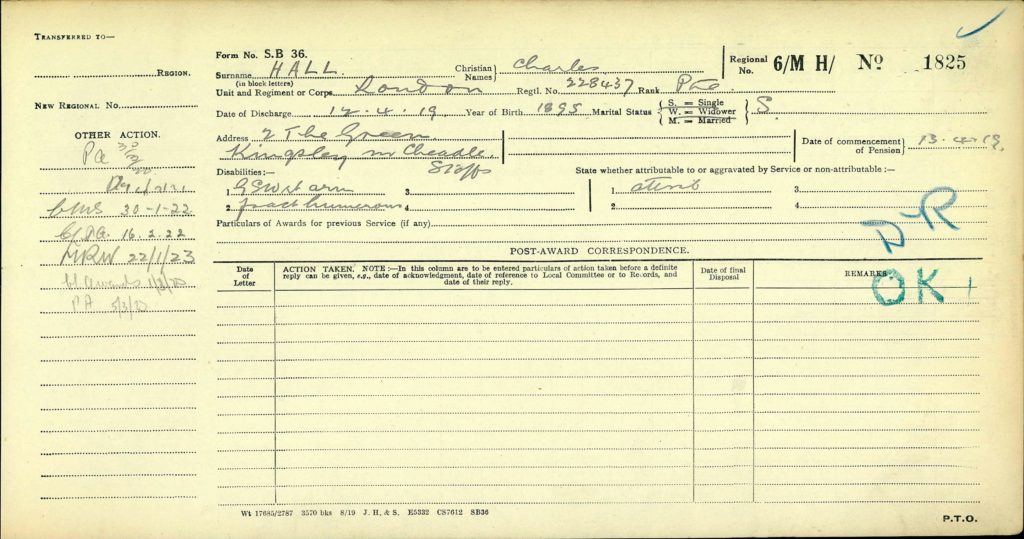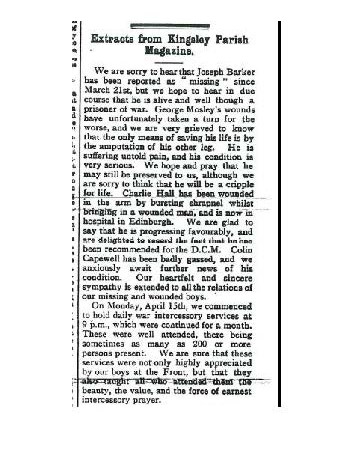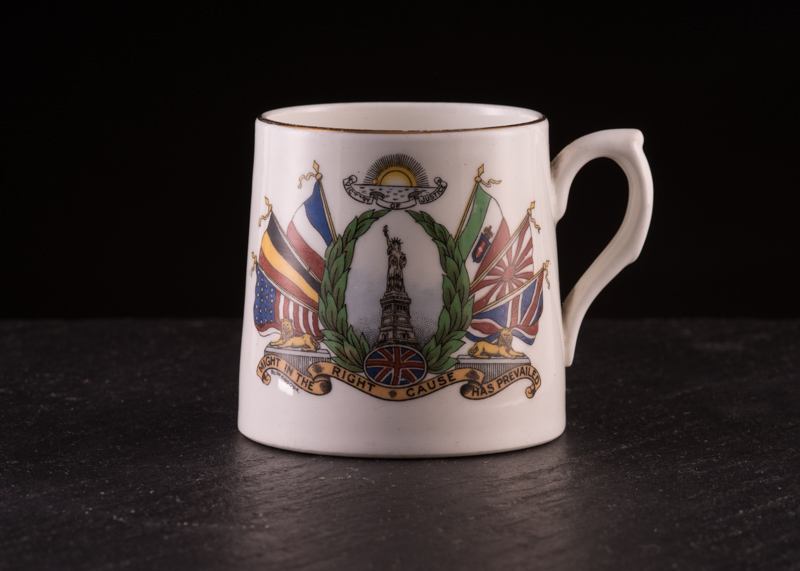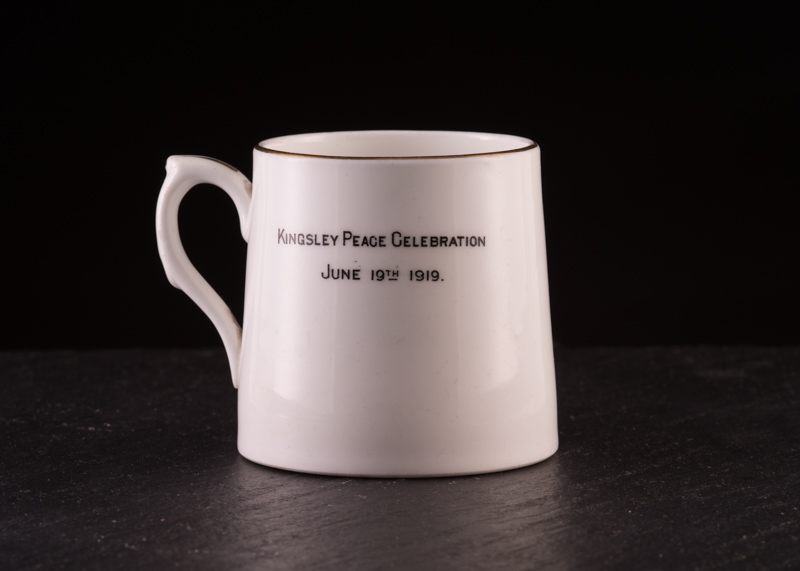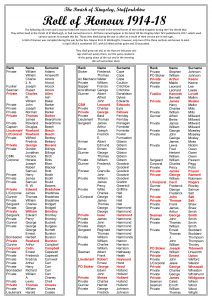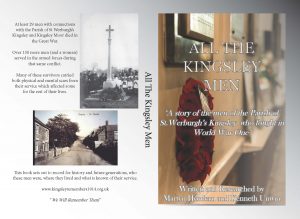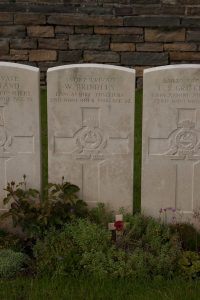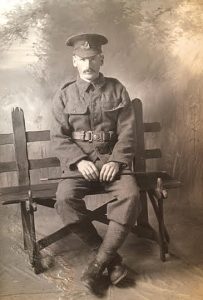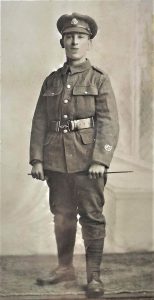Kingsley’s War Memorial was unveiled on Sunday, 20th February 1921, (the photograph below depicts the occasion). In fact, there are two memorials, a plaque in St. Werburgh’s Church and a Wayside Cross on Dovedale Road, at its junction with Church Street. (Dovedale Road was a field in 1921).
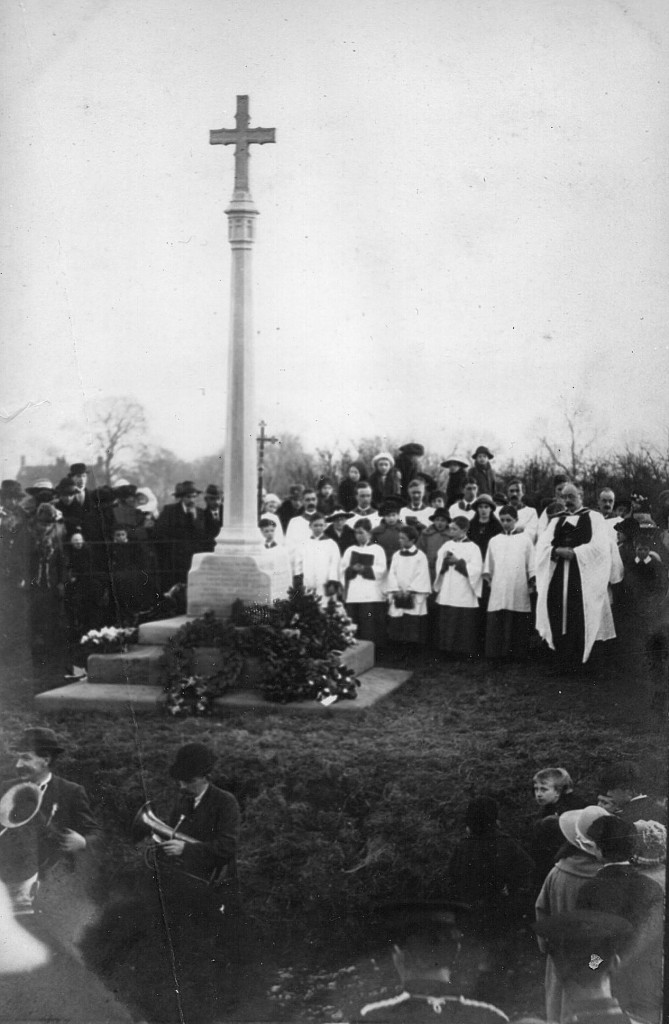
The cost of Kingsley’s plaque was met by parishioners and friends of the men who had died. The Wayside Cross was paid for by the parents of Robert Myles-Heywood, in honour of their son’s memory and in memory of the men from the parish who also died in the war.
It is not clear why the Heywood’s chose this spot for their son’s memorial. However, they had close links with St. Werburgh’s Church for a number of years and they were friends of the Bolton family whose factory was at Froghall.
A comprehensive report of the event was recorded in either the Cheadle and Tean Times or the Cheadle Herald and it is reproduced here. The newspapers in which the report appeared are no longer available.
‘Impressive service took place in Kingsley afternoon, when the memorial tablet erected on the west wall of the church, and the wayside cross were unveiled’ The former has been erected by the parishioners and others, and is a handsome tribute, in white marble on a grey marble slab, to the memory of those from this parish who made the great sacrifice in the late war. The wayside cross erected by the roadside leading from the church on to Froghall, is also a handsome monument standing some 17ft. high from a stone base. It is made of Hollington stone, and has been erected by Mr and Mrs H. Heywood, of Hales Hall, Cheadle, to the memory of their only child, Robert Myles Heywood, who died of wounds on February 15th 1915. This also bears the names of the Kingsley men who fell in action.
The proceedings commenced soon after two o’clock, when 50 or 60 of the ex-service men were marshalled on the Oak Bank by Lieut. T. Alcock, and, accompanied by the schoolchildren, tradespeople and others.
Meanwhile a large congregation was assembling in the church, and by the time that the ex Servicemen were seated the church was filled to overflowing. There must have been two or three hundred people unable to find accommodation, but these remained in the precincts of the church. Amongst the congregation were Mr. and Mrs. R. Heywood, Colonel Crooke (cousin of Mrs. Heywood, Dr. and Mrs. Bearblock, and Mr. E.J. and Mrs. Bolton, Oakamoor, and many other prominent local residents.
The service was most impressive, and the hymns were well sung by the vast congregation. The clergy present were the Rector (the Rev. W. G. Mayne), and the Rev. J.H.J. Daggar (Foxt with Whiston), and the Rev. S.H. Hoare (Hanley), formerly chaplain to the Overseas Forces, who preached a sermon most appropriate to the occasion. He particularly laid stress on the great sacrifices made by the mothers and wives in the loss of their loved ones.
Previous to the sermon the memorial tablet erected by the public was handed over to the care of the church by Mrs. Jas Bradshaw, sen., on behalf of the subscribers and from the rectory.
As the clergy and choir left the church to proceed to the wayside cross, the recessional hymn, “For All the Saints,” was sung. Mr. Holbrook was the organist. The collection for St. Dunstan’s Hostel was £14.
Rarely, if ever, has a larger concourse of people assembled in Kingsley than that which attended the simple but beautiful service by the wayside. The roadway was lined and the banks too, albeit a more orderly or reverent crowd never were together. Every word of the Rector’s dedication was listened to eagerly, and as Mrs.Bearblock unfurled the Union Jack from the base of the Cross the silence was most impressive. Then the whole congregation joined in the singing of the hymn O God Our Help In Ages Past, the band accompanying.
Dr.Bearbrook added a few words to the excellent sermon heard in the church, and said, could he have his way, he would have erected throughout England these wayside crosses as a reminder for the great sacrifices made by these heroes.
Still another impressive part was seen when the whole of the ex-servicemen
filed singly past the cross, and each one saluted to the memory of his comrades.
Wreaths were then deposited at the foot of the Cross, these including the following: –
“In grateful memory, from the subscribers to the tablet”;
“In loving memory of our dear son Gunner G.Ramsell”;
“In memory of the members of the Kingsley Reading Room”;
“In sacred remembrance of G.H.Smith, from his father, mother, brothers and sisters”;
“In loving memory of our dear brother, Geo.Ramsell”;
“Kingsley United Service Club, in memory of our fallen comrades, also Lieut. Heywood, of Hales Hall, from ex-servicemen of the parish”;
“In loving memory of Pte. Brindley, from mother and family”;
“In fond remembrance of Pte.Geo.Wheawall”;
“In remembrance of Jas.Poyser”;
“In memory of fallen heroes, from the Kingsley Red Cross Society.”
Both during the service in the church and at the Cross, the “Last Post” was sounded by Mr Ralph Hall.
The tablet in the church, which is the work of Messrs. Mellor, of Burslem, bears the following inscription: “To the Glory of God and grateful memory of the men of this parish who gave their lives for their King and Country in the Great War, 4th August 1914 -11th November 1918.
Geo.H.Smith, Sept 22nd 1914;
Robert M.Heywood, Feb 15th 1915;
Rowland A.I.Beech, Feb 21st, 1915;
Thomas Salt, Oct 9th 1915;
James Poyser, March 16th, 1916;
Charles Allen Aug. 12th, 1916;
Isaac Hammond, Aug 31st, 1916;
Arthur Keene, Oct. 12th, 1916;
Thomas Clowes, Oct. 19th, 1916;
Ernest Upton, April 9th, 1917;
George Fallows, April 19th, 1917;
Edward E. Bradshaw, May 21st, 1917;
George Wheawall, Aug.8th, 1917;
Thomas Barker, Aug.8th, 1917;
Rowland J. Burston Dec.12th, 1917;
James Meakin, Jan. 20th, 1918;
Jas.H.Wildgoose, May 8th, 1918;
Colin Capewell, May 26th, 1918;
George Ramsell, Aug. 8th, 1918;
Moses Holland, Oct 5th, 1918;
Wm. Brindley, Nov 2nd, 1918;
John W. Salt, Nov 18th, 1918;
Kenneth R Lovatt, Dec 5th ,1918;
Rowland J Beech, Aug 30th, 1919;
Erected by the parishioners and other friends.
The inscription at the base of the cross is as follows: “Robert Myles Heywood, of Hales Hall, Cheadle, Lieut., 2nd Batt. The Buffs, born Feb. 1st, 1884, died Feb. 15th 1915, of wounds received in action near Ypres, Feb.14th, ‘ln Domino Confido.’ Erected by his parents in cherished remembrance of their only child. Also in honoured memory of the men of Kingsley who laid down their lives for their country in the Great War 1914-1918. ‘They died that we might live.’
Interestingly, George Price-Bevans is listed on the Wayside Cross but for reasons unknown is not recorded on the St. Werburgh’s Plaque. His listing on the Wayside Cross seems to have been a later addition as it is listed after Rowland Beech (Snr) who died before him.
Two other names who feature on the Wayside Cross, (G. W. Hood and J. Tideswell) appear to be later additions. They are inscribed under the names of men lost in WW2.
Each year Kingsley Parish holds two acts of Remembrance. On Armistice Day, (11th November), a service is held at the Wayside Cross in Dovedale Road. On Remembrance Sunday, a service is held in St. Werburgh’s Church.

